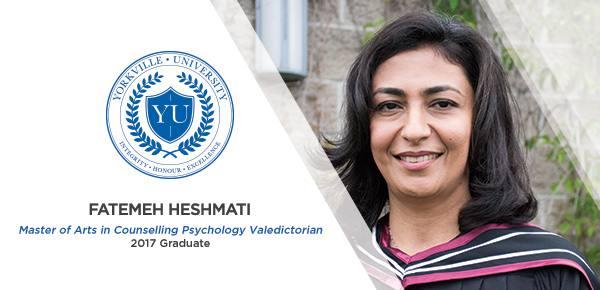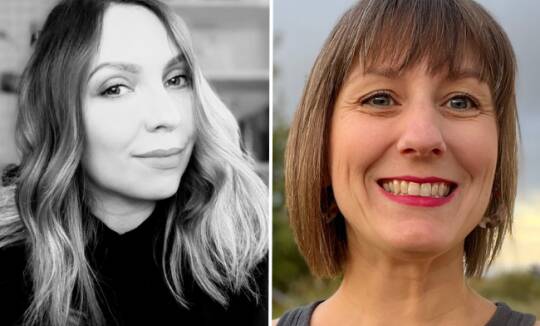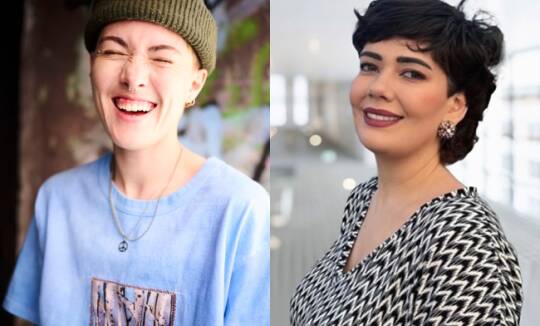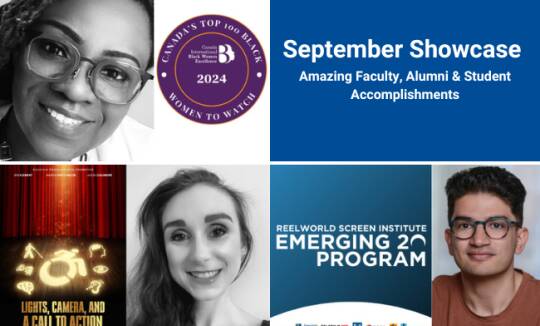
For Fatemeh Heshmati, graduating with a Master of Arts in Counselling Psychology from Yorkville University in June 2017 represents the culmination of not only a challenging course of study, but a long-term triumph over significant adversity that led the Iranian-born mother of two and former children’s radio host to uncover some deep truths about herself, and ultimately, to find her passion.
As a young girl growing up in Iran, Heshmati had always been deeply invested in learning and academics. She was also committed to helping people. But while she was preparing to attend medical school, tragedy struck.
“My father had a very bad accident and that basically changed the whole game for me,” she said. “I couldn’t make it to medical school because of the financial problems we had, so I chose to be a midwife.”
But Heshmati soon realized that midwifery wasn’t going to fulfill her intellectual curiosity.
“Halfway through my bachelor’s degree [in midwifery], I realized that I need more challenge,” she explained. “I wanted more than just a bachelor’s degree, and I couldn’t go any further with midwifery. I had a desire to do research and a curiosity that wouldn’t be fulfilled by midwifery. I really wanted to study and to give back to the medical science field.”
Heshmati switched her focus to science and eventually was accepted into a PhD program in Iran. But once again, her academic plans were thwarted by life events—this time, by her family’s circuitous immigration to Canada in 2002, and the arrival of her first child.
“Our immigration took a year and we had to move from one country to another country before we finally came to Canada in 2007 when my second child was born. So I put my studies on hold,” said Heshmati.
In 2010, she made the decision once again, to return to school. At this point, she already had a master’s degree in Physiology, and so applied to a PhD program. However, life events arose once more, which prevented her from being able to pursue the PhD. Instead, she received her second master’s degree in cell biology
“One of my children was diagnosed as special needs. This diagnosis put me at home again,” Heshmati said.
After spending some time at home caring for her child, Heshmati decided to go back to work. But she struggled to find meaningful employment. At this point, she considered returning to her PhD studies once again, applying to do her doctorate in neurodevelopment. She began working in a lab as a PhD candidate when another misfortune took place.
“I experienced a trauma, and that changed everything for me,” said Heshmati, with residual sadness in her voice. “So I took a leave of absence from my studies, thinking I would get over my trauma and go back to school. During this time, I was grieving for the loss of another chance to pursue my academic dream. I really loved the research I was doing, especially when its focus was on neurodevelopmental disorders, something that I had a deep connection with due to my child’s condition. But it seemed at this time that I just couldn’t get back to it, because of all the family problems I was facing.”
This cascade of obstacles might have seemed insurmountable for most, but Heshmati’s focus has always been on solutions and working through her problems. She knew in this instance though, that she needed outside help.
“It was at this point that I decided to seek counselling,” she said.
“I had no experience with counselling before, but I started receiving sessions at that time, and my counsellor introduced the process to me.”
Heshmati found psychological inquiry and talk therapy to be very helpful, and her curiosity was piqued.
“I thought, now that I’m at home, really missing my studies, why not take some psychology courses? It helped me personally to know myself better, and as I learned more about this field, it occurred to me that since I have a passion to help people, why not help them in a more concrete way?” she recalled.
Her counsellor recognized her interest and recommended that Heshmati look into Yorkville University’s Master of Arts in Counselling Psychology.
“He talked about the quality of the courses and the quality of the program, and that’s why I became interested in [Yorkville],” explained Heshmati.
She wasn’t actively looking for another degree, but after enrolling at Yorkville, Heshmati soon found herself absorbed by the course material.
“It was very interesting to me. Course after course, I sank into the program, and I soon found I couldn’t stop it,” she said.
Furthermore, the logistics of remote education suited her lifestyle and the needs of her family perfectly.
“I have to put the needs of my family first, so if I want to have a family and to study, there is no other option than to do a program that I can follow remotely at home,” she confirmed.
She was very aware of some of the perceived drawbacks of flexible learning but was prepared to actively mitigate those challenges.
“People sometimes question [online learning], because you don’t have face-to-face classmates, etc., so I tried to fill those gaps myself, by being more active in the virtual classroom, and connecting with my classmates in the real world,” said Heshmati.
Her resolution to participate fully in her classes, despite feeling self-conscious at times, allowed her to take full advantage of the benefits of online learning, and to flourish in the program. She also didn’t hesitate to put in the extra effort and to find additional resources to supplement the coursework if necessary.
“I put my shame aside, and thought, well, I have questions, and I have to ask them. After all, I am a scientist, and curiosity is part of my personality and my job,” she said. “I also studied more than the program required, because I wanted to make sure that I truly knew the new information. Perseverance and being proactive helped me excel.”
Perhaps paradoxically, Heshmati eventually found her calling in counselling not because she was attached to the outcome, but because the program allowed her to discover herself.
“I saw the MACP program not as a way to get another degree, but as a path to self-development—as a way of developing my personality and of helping myself before helping others,” she said.
By the end of the MACP program, Heshmati had been nominated by one of her professors for the Academic Excellence Award, and she is now thrilled to be representing her fellow MACP graduates as valedictorian.
Heshmati is looking forward to using the public speaking skills that she honed while hosting a kid’s channel on Iranian National Radio, in her valedictory speech. But more significantly, she is eager to employ her competencies as a counsellor to give back to her community.
“I have an incredibly supportive family, and I had motivating and supportive instructors who gave me a foundation,” said Heshmati.
“The [MACP] program helped me immensely during a difficult time, and I look forward to using what I learned in this program to help the people around me in a way that I couldn’t do before.”






